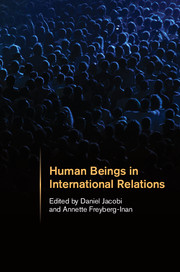Book contents
- Human Beings in International Relations
- Human Beings in International Relations
- Copyright page
- Contents
- Contributors
- Book part
- Introduction Human being(s) in international relations
- Part I International political anthropology
- Part II International political post-anthropology
- Conclusion Toward an International Political (Post-)Anthropology
- Bibliography
- Index
- References
Bibliography
Published online by Cambridge University Press: 05 September 2015
- Human Beings in International Relations
- Human Beings in International Relations
- Copyright page
- Contents
- Contributors
- Book part
- Introduction Human being(s) in international relations
- Part I International political anthropology
- Part II International political post-anthropology
- Conclusion Toward an International Political (Post-)Anthropology
- Bibliography
- Index
- References
- Type
- Chapter
- Information
- Human Beings in International Relations , pp. 332 - 368Publisher: Cambridge University PressPrint publication year: 2015



